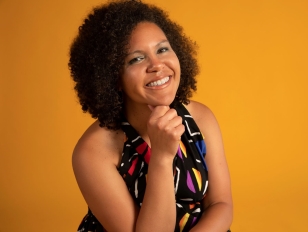
Best-selling author, dietetic thought leader, and community organizer Jessica Wilson will discuss the impacts of racism and misogyny on body image and wellness at Buffalo State University on Thursday, February 9, at 4:00 p.m. in the LoRusso Alumni and Visitor Center.
Sponsored by Buffalo State’s Equity and Campus Diversity Office, Wilson’s presentation is free and open to the public. Her talk, which includes a book signing, free raffle, and light refreshments, kicks off Buffalo State’s 2023 celebration of Black History Month.
“We are thrilled to welcome Jessica Wilson to campus,” said Lisa Fronckowiak, the university’s interim chief diversity officer. “In our rich discussions about diversity, it’s important to include such topics as body image and wellness. Jessica’s message is especially important for our young people who are forging their identities while surrounded by images from traditional and social media that are unrealistic at best and racist and misogynist at worst.”
Wilson, who has worked as a clinical dietitian since 2007, co-hosts the podcast My Black Body with Rawiyah Tariq. They focus on “what body liberation can look like while healing damage done by white-centric treatments” for eating disorders.
Wilson speaks openly about her experience navigating the dietetics field as a Black, queer dietitian. She also addresses how the public health and medical framing of “healthy eating” and “obesity” have contributed to disordered eating and self-blame. Her book, It’s Always Been Ours; Rewriting the Story of Black Women’s Bodies (Hachette Books), will be released February 7.
“Jessica Wilson, an expert in her field who can relate to the African American population, is the perfect speaker for Black History Month,” said Carol DeNysschen, dean of the School of Professions and former chair of the Health, Nutrition, and Dietetics Department. DeNysschen worked closely with the Equity and Campus Diversity and President’s offices to bring Wilson to campus.
“As a fellow registered dietitian, I am excited to see what Jessica has to say,” DeNysschen said. “In my opinion, body shape shouldn’t matter as long as you’re healthy. The key is to find the balance between being healthy and being happy with who you are so that you can ward off disease down the road.”
Space is limited for Wilson’s talk, and online reservations are highly encouraged. For more information, please call (716) 878-6210 or email eeoequity@buffalostate.edu.
-----------------------------------------------------------------------------------------------------------------------------------------------------------------------------------------------------------------------------------------------------------------------------
The Garman Art Conservation Department will host “Racial Justice and Community Healing through Cultural Heritage Preservation,” a virtual panel discussion that focuses on grassroots efforts to conserve cultural material created to commemorate and protest violence rooted in racism and social justice, on Friday, February 24, from 2:00 to 4:00 p.m. The presentation is free and open to the public.
Panelists Jeanelle Austin, executive director and co-founder of the George Floyd Global Memorial (GFGM) and lead caretaker of the memorials at George Floyd Square; Valinda Carroll, ’99, professional conservator of works of art on paper and historical documents and principal of Infinity Art Conservation; and Frederick Wallace, ’91, chief conservator at Newfields Indianapolis Museum of Art, will discuss conservation, collection management, organizational structure, administration, and funding of the GFGM. The story of the GFGM will be the start of an ongoing dialogue on community-centered conservation.
Participants must register for the Zoom meeting.
Other Black History Month events taking place on campus:
Free Renty: Lanier v. Harvard (2021), Beyond Boundaries Film and Discussion Series, Thursday, February 9, at 7:00 p.m. in the Burchfield Penney Art Center’s Tower Auditorium. From the film’s website: “Free Renty tells the story of Tamara Lanier, an African American woman determined to force Harvard University to cede possession of daguerreotypes of her great-great-great-grandfather, an enslaved man named Renty. The daguerreotypes were commissioned in 1850 by a Harvard professor to “prove” the superiority of the White race. The images remain emblematic of America’s failure to acknowledge the cruelty of slavery, the racist science that supported it, and the white supremacy that continues to infect our society today. The film focuses on Lanier and tracks her lawsuit against Harvard, and features attorney Benjamin Crump, author Ta-Nehisi Coates, and scholars Ariella Azoulay and Tina Campt.” Watch the trailer.
Black Horror: Telling a New Story: Learn how filmmakers have flipped the script in the Black horror subgenre. Sponsored by the Honors Program. Monday, February 13, from 4:30 to 5:30 p.m. and Wednesday, February 22, from 7:00 to 10:00 p.m. in Upton Hall 230.
Historical and Iconic African American Leaders in American History: Organized by Michael Heflin, assistant dean for inclusion and equity, and geared toward students, this discussion will take place Tuesday, February 14, from 12:15 to 1:30 p.m. in Campbell Student Union 414.
The Africana Studies Research Symposium will feature presentations by Buffalo State students Jayla Phillips and Anthony Skubis and faculty members Carlos Jones, associate dean of the School of Arts and Sciences, Africana studies coordinator, and former associate professor of dance; Jennifer Ryan-Bryant, professor of English; and John Torrey, assistant professor of philosophy. Thursday, February 16, from 11:00 a.m. to 2:00 p.m. in the Campbell Student Union Assembly Hall. The symposium is co-sponsored by the English Department and Africana studies program and is open to everyone.
Black History Month Trivia: Residence Life will host trivia games for students on Thursday, February 16, from 12:15 to 1:30 p.m. in Bulger Communication Center 214.
Some content on this page is saved in PDF format. To view these files, download Adobe Acrobat Reader free. If you are having trouble reading a document, request an accessible copy of the PDF or Word Document.
